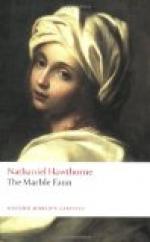And, accordingly, Donatello’s bust (like that rude, rough mass of the head of Brutus, by Michael Angelo, at Florence) has ever since remained in an unfinished state. Most spectators mistake it for an unsuccessful attempt towards copying the features of the Faun of Praxiteles. One observer in a thousand is conscious of something more, and lingers long over this mysterious face, departing from it reluctantly, and with many a glance thrown backward. What perplexes him is the riddle that he sees propounded there; the riddle of the soul’s growth, taking its first impulse amid remorse and pain, and struggling through the incrustations of the senses. It was the contemplation of this imperfect portrait of Donatello that originally interested us in his history, and impelled us to elicit from Kenyon what he knew of his friend’s adventures.
CHAPTER XLII
REMINISCENCES OF MIRIAM
When Hilda and himself turned away from the unfinished bust, the sculptor’s mind still dwelt upon the reminiscences which it suggested. “You have not seen Donatello recently,” he remarked, “and therefore cannot be aware how sadly he is changed.”
“No wonder!” exclaimed Hilda, growing pale.
The terrible scene which she had witnessed, when Donatello’s face gleamed out in so fierce a light, came back upon her memory, almost for the first time since she knelt at the confessional. Hilda, as is sometimes the case with persons whose delicate organization requires a peculiar safeguard, had an elastic faculty of throwing off such recollections as would be too painful for endurance. The first shock of Donatello’s and Miriam’s crime had, indeed, broken through the frail defence of this voluntary forgetfulness; but, once enabled to relieve herself of the ponderous anguish over which she had so long brooded, she had practised a subtile watchfulness in preventing its return.
“No wonder, do you say?” repeated the sculptor, looking at her with interest, but not exactly with surprise; for he had long suspected that Hilda had a painful knowledge of events which he himself little more than surmised. “Then you know!—you have heard! But what can you possibly have heard, and through what channel?”
“Nothing!” replied Hilda faintly. “Not one word has reached my ears from the lips of any human being. Let us never speak of it again! No, no! never again!”
“And Miriam!” said Kenyon, with irrepressible interest. “Is it also forbidden to speak of her?”
“Hush! do not even utter her name! Try not to think of it!” Hilda whispered. “It may bring terrible consequences!”
“My dear Hilda!” exclaimed Kenyon, regarding her with wonder and deep sympathy. “My sweet friend, have you had this secret hidden in your delicate, maidenly heart, through all these many months! No wonder that your life was withering out of you.”
“It was so, indeed!” said Hilda, shuddering. “Even now, I sicken at the recollection.”




